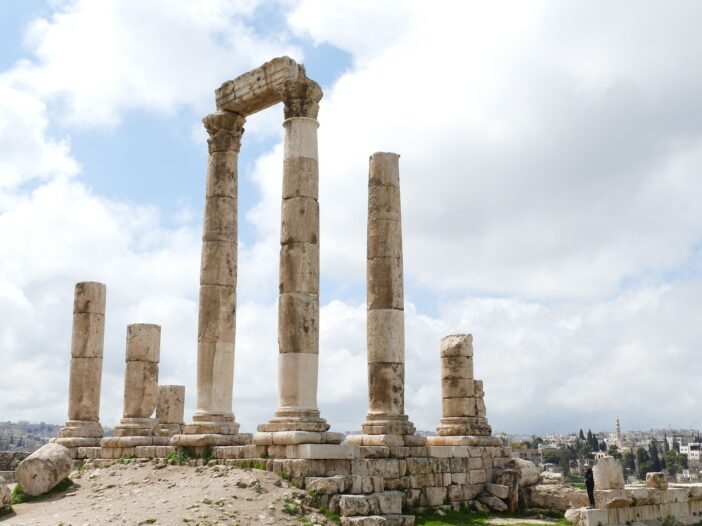
Have you ever felt like everybody is doing OK except you?
When you experience hope deferred, dreams dashed, or the crush of world crises, how do you bear up under such weight? If you have a friend who’s lived a godly life despite huge hardships, that may encourage you to keep on keeping on.
But what if you don’t have a role model like that to look to?
Look to the first-century church in the city of Philadelphia.
That speck in modern-day western Turkey contained a church that didn’t have “size or sizzle.” Compared to other churches in the region, it was relatively small in numbers, influence, and resources. In fact, the people of that church often had their hands full with simply trying to survive everyday life.
Philadelphia sat on a fault line in an earthquake-prone region. In 17 AD, an off-the-charts quake essentially leveled twelve cities in the area. Philadelphia suffered repeatedly from severe aftershocks.
Roman Emperor Tiberius quickly offered relief and rebuilding assistance to the region—for self-serving reasons: to (1) establish himself as the new emperor, (2) squash any interpretation of the earthquake as divine condemnation of his rule, and (3) secure the loyalty of the affected cities.
You see, those twelve cities dotted the imperial post road that ran from Rome to Tarsus and points farther east. In particular, Philadelphia stood at an important junction of that major mail and trade route.
Rome’s help came with caveats. Rebuilds were overtly Roman in style. Tiberius proclaimed himself “founder” of the rebuilt cities and reinforced that by renaming them as an ode to himself. Philadelphia became Neocaesarea (“New Caesar”). (Philadelphia’s name would change again—in another very Roman way—after a similar catastrophe decades later.) Tiberius’s rebuilt cities jockeyed for ongoing favored status by embarking on “loyalty projects” in the emperor’s name. Often that translated to erecting Imperial cult structures.
The earthquake shifted the ground underneath the Philadelphians’ feet and the area’s geopolitical culture around them. Yet, despite threats to their land, identity, and beliefs, the Philadelphians clung to their Christianity. They kept their faith in the face of cracked buildings and pressure to accept Roman pagan practices. The church saw its location along Rome’s trade route as useful, so it did what it could to live out the Gospel and spread its Good News.
In Revelation 3:8, Jesus, speaking through the Apostle John, says to the church in Philadelphia, “I know your deeds” and “I know that you have little strength, yet you have kept my word and have not denied my name.”
Jesus did more than give the Philadelphians pats on the back for their perseverance. He lavished them with six promises. I want to focus on two of them:
- Jesus would make their little strength into a pillar.
- He would give them a three-fold new name.
These promises hit home culturally, physically, and spiritually. When you see ruins of temples and palaces, what’s still standing when all else is gone? PILLARS. Pillars are the strongest part of a structure. How amazing that God promises He will turn our feeble strength into a pillar! And God’s construction plans last for eternity!
In addition, historically many pillars contained inscriptions, usually dedications to the gods. Jesus says He will give the church at Philadelphia a three-fold new name. In contrast to the vainglorious monikers the Romans had thrust upon the Philadelphians’ rebuilds, Christ will engrave eternal names upon His pillars—the people themselves.
What does all of this mean for you and me? At least six things:
- You don’t need to be strong in adversity—only faithful through it.
- Don’t despise the “small things” of your life (Zechariah 4:10).
Seemingly insignificant days can add up to a faithful life. - You don’t have to wow anybody.
Instead of saying you’ll do great things for God, simply tell people how great God is. - When you feel you have little influence, remember God is the great multiplier of resources.
- God’s infinite strength will turn your little strength into a pillar—even when your world shakes around you.
- God’s names for you are added assurance of who you are and whose you are.
Praise God that staying the course is precious in His eyes—because “little is much if God is in it.”
Never miss a post!





I didn’t know all that about the church at Philadelphia! I love how they were faithful, though small.
Yes! It’s such an encouragement to learn their story!
Thanks for the reminder that we don’t have to do great things for God. Too often we feel we have fallen short in our accomplishments, but He never asks us to do great things, just to be faithful telling others about our great God.
Yes, and it’s humbling to think about God’s economy in that way. God delights in our faithfulness, no matter what form that takes. It brings to mind the monk Brother Lawrence, who communed with God while washing dishes. His “little” book “The Practice of the Presence of God” is still in print today and is an encouragement worldwide. We won’t know this side of heaven what our faithfulness will accomplish!